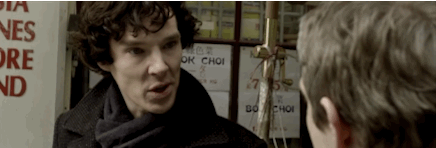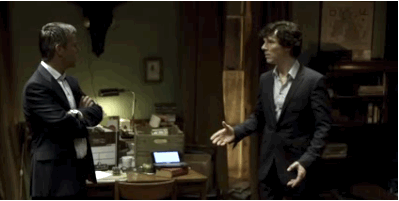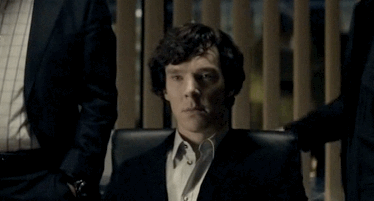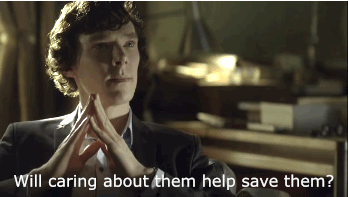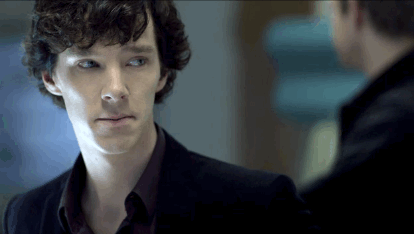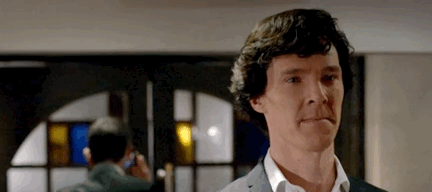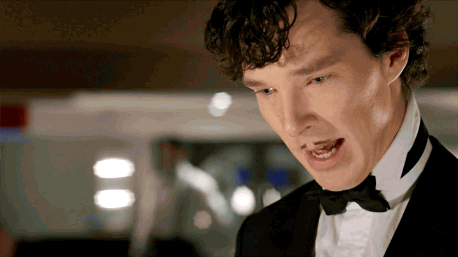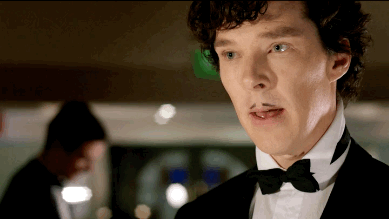Posted by SusiGo  February 7, 2015 10:56 am | #41 |
Well said, miriel. I tried all three groups. The first one I gave up on because I was bored stiff (sorry for offending the Granada fans but I fell asleep during "The Sign of Four"). I liked the RDJ films because they entertain me and, I must admit, they re-awakened my interest in SH. Elementary did nothing for me. The only adaptation that got me really hooked is "Sherlock" which I love just for taking those risks and daring to create something completely new out of something so well-known.
------------------------------
"To fake the death of one sibling may be regarded as a misfortune; to fake the death of both looks like carelessness." Oscar Wilde about Mycroft Holmes
"It is what it is says love." (Erich Fried)
“Enjoy the journey of life and not just the endgame. I’m also a great believer in treating others as you would like to be treated.” (Benedict Cumberbatch)

Posted by tonnaree  February 7, 2015 2:26 pm | #42 |
miriel68 wrote:
First of all, I think that every time there is a new adaptation of a canonical character, such as Sherlock Holmes, there are basically three ways for the writers to go:
a. you "honor" the original character and just wants him to be carefully transferred from paper to other medium (film, usually) - Granada productions
b. you "use" character to lure the public and to create something to your liking - RDJ Sherlock, JLM Elementary.
c. you enter in the dialogue with the original text, you ask yourself questions you give your interpretation. BBC Sherlock
I find the a strategy boring, the b strategy indifferent and the c strategy creative, if risky. Every beloved book has a group of hard-core admirers who are mainly interested in the adaptations sticking as faithfully to the original (and their personal idea of the original) as possible. They can probably accept easier the b strategy than the c one, because the b is not threatenig the canon, as the c is.
Why is Sherlock such a stellar success, while Elementary is not? Acting, procuction values etc. apart, it is because it does more than just taking the characters and using them for a new format. It explores the canon and gives a new - arguably subjective, arguably agressive - interpretation of it. The very fact it stirs such violent emotions is the proof of its creative power. Is there something controversial about Brett's interpretation? More than this is there something NEW in Brett interpretation, something we didn't already know about Holmes from ACD canon?
Best excplination of the difference between Elementary and Sherlock I have heard.
----------------------------------------------------------------------
Proud President and Founder of the OSAJ.
Honorary German
"Anyone who takes himself too seriously always runs the risk of looking ridiculous; anyone who can consistently laugh at himself does not".
-Vaclav Havel
"Life is full of wonder, Love is never wrong." Melissa Ethridge
I ship it harder than Mrs. Hudson.


Posted by Ah-chie  February 7, 2015 8:02 pm | #43 |
I too will add that miriel68 has read my mind and wrote what I think exactly.
The canonical Holmes admirers (like those in the selected blogs by Nakahara) will never accept what Moftiss have created because like miriel68 said they aren't looking for creativity - they are looking for the familiar and comfortable retelling. And I don't have a problem accepting that this is something that some people want to see and enjoy that sort of story. That's what the "a" and "b" options in miriel's post were all about. But as (s)he so succinctly put it, this isn't where BBC Sherlock is coming from.
I have to add that their blogs/opinions seem to come from a place of more than just a bit of arrogance to me. I have a real long standing dislike for those folks who chronically rend their garments about an author's creative work because it isn't following exactly what they want and get all huffy and act like they know better than the people who are doing all the work. Sure, we all want to look critically at a work from time to time, sorting out what we like and don't like about the details. But to question the motives of the creatives and say they are annihilating the whole thrust of the story - that's insulting their integrity.
I guess this rant comes, for me, from a position of living everyday with a writer like I do. I feel very defensive about a writer's/creator's integrity being unfairly attacked like I see happening to Moftiss. My message to the blog writers like "Trove" is "Get off you high horse and stop watching it if it isn't what you like. Go write your own book, TV show or film... see if anyone will publish it, produce it or film it."
But don't expect the creatives to bow to your personal vision of what you think their work should be.
BBC Sherlock is Moftiss' baby and they can do with it what they want. They have a vision (of which we have only seen 9 parts... with more to come) and everyone on the show works hard at producing quality entertainment for those who enjoy this kind of creatively risky, original material. The pissing and moaning and wringing of hands about the "annihilation" of the character of Sherlock in Season 3 sounds like it is coming from a place of exaggerated self-importance of the blogger to me. It's all part of the "I know better than Moftiss what Sherlock is really about" syndrome. They act like they have been victimised by Moftiss and it's such a tragedy!!!!! (why did I suddenly have that scene in TSoT come to mind when Sherlock plopped the eyeball into his teacup).
I don't believe for a nanosecond that Moftiss care any less for Sherlock Holmes than these bloggers. I believe the creators of the show have wide, immaginative vision for the show and I am prepared to go along for the entire ride because I am enjoying myself.
-Val
Last edited by Ah-chie (February 7, 2015 8:38 pm)
"The only shipping I know is shipping containers."
-Benedict Cumberbatch
Posted by SusiGo  February 7, 2015 8:11 pm | #44 |
Again I can only agree. ![]()
------------------------------
"To fake the death of one sibling may be regarded as a misfortune; to fake the death of both looks like carelessness." Oscar Wilde about Mycroft Holmes
"It is what it is says love." (Erich Fried)
“Enjoy the journey of life and not just the endgame. I’m also a great believer in treating others as you would like to be treated.” (Benedict Cumberbatch)

Posted by Zatoichi  February 8, 2015 12:04 am | #45 |
I am not sure if I should answer this, as I feel uncomfortable to talk about people who aren´t present at the discussion.. but I really like this blog, I´ve been following her for a while and love the way she loves and always defends Sherlock.. one of the rather rare Pro-Sherlock voices in the fandom. And while I might not have worded it as sharply as that, I can empathize with a lot of her emotions about the direction the show took in S3.. so judging her statements from this point of view I don´t see them so much as coming from a place of arrogance or exaggerated self-importance, as from a place of hurt feelings and disappointed expectations.. We all know it´s just fiction and we shouldn´t take things too seriously, but if you had a vision of a character you held very dearly to your heart, it can indeed hurt to see your own vision diverge from what is shown on screen so much. (Especially if you spent two years filled with anticipation - not an easy task to just shrug it off and stop watching something you´ve been so attached to.)
I think social media blurrs the lines between an official review, which is supposed to be read by a lot of people and possibly even the authors themselves, and an outlet of your emotions to a broader circle of friends.. while I don´t know for sure, I feel most tumblr-blogs are intended to be the latter and are worded accordingly. I don´t think the Sherlock-writers will ever actally read any of this, but if they do I hope they won´t take any of this personally, but will just see it as an emotional reaction of a fan towards their show - just like there are squees there will be rants, and when you go and look for feedback on social media sites dedicated to your fandom you will come across both, and both not worded very carefully in the heat of the moment. (But probably an invaluable source of direct consumer-feedback. ![]() )
)
Posted by miriel68  February 8, 2015 9:00 am | #46 |
I think it is quite natural and "human" to feel disappointment (I wouldn't go so far as "hurt feelings") about a portrayal of your beleved character in a movie. I have yet to see an adaptation of my beloved Three Musketeers which wouldn't disappoint my yearning to see a sweeping noble historical saga instead of farcical comedy or historical fantasy it usually becomes on screen.
The point is, should we base our evaluation of a movie/ an artistic creation accordingly to the divergence of "our" projection and the creative proposal we are confronted with? Interestingly, it happens always more often not only with the viewers but with the "professional" critics as well. I saw it a lot in TIG reviews: the people found Turings portrayal different from what they wanted it to be, therefere they condamned the whole film.
Also, the expansion of social media and of fandom visibility created new dynamics between the audience the the movies: the sense of entitlement and the belief that the creators of a given cult show/movie "owe" the fans.
Well, no. If we were to agree with this principle, it would be the death of art. A creative work is not about pleasing crowds (although it is always nice and almost always necessary from the financial point of view). It's about proposing your own idea. And the audience, of course, have every right to like it or not, but it should not feel like they had right to "demand" something, IMO.
Posted by Ah-chie  February 8, 2015 5:18 pm | #47 |
miriel68 wrote:
... the expansion of social media and of fandom visibility created new dynamics between the audience the the movies: the sense of entitlement and the belief that the creators of a given cult show/movie "owe" the fans.
Well, no. If we were to agree with this principle, it would be the death of art. A creative work is not about pleasing crowds (although it is always nice and almost always necessary from the financial point of view). It's about proposing your own idea. And the audience, of course, have every right to like it or not, but it should not feel like they had right to "demand" something, IMO.
Bravo miriel68!
When I read these blogs my sympathies lean towards Moftiss because I personally know how much blood, sweat and effort (and indeed a real chunk of themselves) every writer puts into their creations. This is their livelihood. It isn't their "hobby" or passing whimsy done to while away the hours. To insult their motives or integrity is serious business - at least to me.
Any professional writer can, and does, accept constructive criticism of their work. It is part of the nature of putting yourself out there in the public eye and letting people have their go at you. You roll with the punches for the most part. But there isn't a creative person out there that wouldn't tell you that when someone calls your personal integrity into question (saying that you are wantonly assassinating or annihilating the very thing that you created and have no basic understanding of your own work) that wouldn't sting deeply.
Regardless as to whether Moftiss sees those blogs, after reading them myself I feel strongly that ideas expressed within (even when are motivated by genuine feelings) are in reality, by their language and content, an assault on the integrity of the current custodians of the characters on the show.
Whether the writers of these various blogs are cognisant of the results of their words I cannot say, but never the less when they write this sort of thing that is what comes through to me. I refuse to accept their starting premise that Sherlock has morphed into something detestable in Season 3 due to the writers/creators failure to grasp the essence of their own work and will continue to challenge those ideas in any discussions.
I look forward to the day that bloggers can empathise with the real people who create such imaginative works at least as much as they do with fictional characters (which they have those writers to thank for in the first place).
-Val
"The only shipping I know is shipping containers."
-Benedict Cumberbatch
Posted by NatureNoHumansNo  February 9, 2015 12:33 pm | #48 |
I understand what you say, Nakahara, and, if i'm not that bothered by the "arsehole" image of Sherlock, I'm sometimes confused with this version of my favorite detective.
As an holmesian, I always had fun when i was talking with people who hardly kwen him, in remembering them that he's not a prim and proper character in the canon. Friendless and drug addict for exemple. He's a 19th century dandy, who doesn't care about society standarts.
But, what make him quite different of other dandies of the littérature is that he seems to have a strong feeling of good and evil, even if it's according to his personal standarts ( that's why i'm not upset by Sherlock shooting Magnussen... to me it's coherent with the canon).
BUT, what confuses and sometimes disappoints me in the BBC Sherlock is the increasing focus on the personnal aspects of Sherlock Holmes, the drama, the sentiments. In the Canon, Watson is surprised and delighted about Holmes comeback after the hiatus, and that's it. It's clear to everyone that Watson can live his life without Holmes, even if he's a dear Friend and that Holmes left without a second thought to keep on with his work . In the BBC, it's a huge fuss, Sherlock is leaving to "save his friends lives" o.O ), John's been grieving for two years and there's a long and lame "forgiveness" scene...)
As much as I am happy with the Watson strong character they made ( in other versions, he always was too weak, too social..) I'm not satisfied with the " Buddy-thing" it's turning to. That's why I almost see molly's character as a "Watson", without the drama aspect ;)
I keep saying to myself that it's a variation rather than an adaptation, that they called it "Sherlock" and not "Sherlock Holmes" so, yes, they want to deal with more personnal aspects. But I sometimes feel Moffat and Gatiss indulge themselves and want to have fun with the character ( same thing with the plots, I was confused and almost angry with the 3 plots beeing related to each other in "the sign of the three"...for god sake, I don't want to Watch an american thriller when I'm watching Sherlock Holmes...)
For good measure, i'd say the BBC version is very clever, sometimes brilliant. They managed to do a convincing modern version . As I said, it's the first version I see where authors pay proper tribute to Watson's strengh ( well, Guy Ritchie did too), they made an great and telegenic Moriarty, Sherlock is fascinating and supporting characters are nicely highlighted ( too much fuss about Irene Adler and Mycroft Holmes IMO, but...) and the dialogues are very acute and fun.
So, I recognize Moffat and Gatiss can do whatever they want with Sherlock Holmes ( Conan Doyle said it himself "marry him, murder him....") and I like it as long as it's good and well plotted, but I sometimes see too much "Sherlock" and not enough " Holmes" ;)
Last edited by NatureNoHumansNo (February 9, 2015 1:02 pm)
Posted by tonnaree  February 9, 2015 1:43 pm | #49 |
Although I am now reading more of the original canon, in a way I'm glad I had not immursed myself in it before discovering BBC Sherlock. Not being deeply emotionally invested in the stories allows me to view the show without much baggage. And when I go back to the original stories it's fun to see the way plots and details have been incorporated.
Not that it's a "better" perspective than someone's who's been a fan of all things Sherlock for decades, just a little different.
Also, all this talk reminds me of something I once read about Stephen King. And interviewer ask him if he ever got angry at movie makers for "ruining" his books. King looked over at his bookshelf and replied, "the books aren't ruined, they're still right there." ![]()
----------------------------------------------------------------------
Proud President and Founder of the OSAJ.
Honorary German
"Anyone who takes himself too seriously always runs the risk of looking ridiculous; anyone who can consistently laugh at himself does not".
-Vaclav Havel
"Life is full of wonder, Love is never wrong." Melissa Ethridge
I ship it harder than Mrs. Hudson.


Posted by tonnaree  February 9, 2015 8:34 pm | #50 |
True, but that doesn't invalidate his point.
The original works of art cannot be ruined and will always be there just as they were created.
If you're very unhappy with a particular adaptation, never watch it again. I don't like the version of The Shining that Kubrick made so I avoid it. However I really liked the made for television mini-series and have watched it multiple times.
Last edited by tonnaree (February 9, 2015 8:36 pm)
----------------------------------------------------------------------
Proud President and Founder of the OSAJ.
Honorary German
"Anyone who takes himself too seriously always runs the risk of looking ridiculous; anyone who can consistently laugh at himself does not".
-Vaclav Havel
"Life is full of wonder, Love is never wrong." Melissa Ethridge
I ship it harder than Mrs. Hudson.


Posted by Vhanja  February 9, 2015 8:34 pm | #51 |
tonnaree wrote:
Although I am now reading more of the original canon, in a way I'm glad I had not immursed myself in it before discovering BBC Sherlock. Not being deeply emotionally invested in the stories allows me to view the show without much baggage. And when I go back to the original stories it's fun to see the way plots and details have been incorporated.
Yes, that's how it is for me as well. I am glad I had never read any Sherlock Holmes stories when I started watching BBC Sherlock. That meant I could appreciate it 110 % without any hesitation. I was a complete book nerd about Harry Potter, and that ruined the movies quite a bit for me for a few years.
__________________________________________________________________________________________________________________________________________
"We'll live on starlight and crime scenes" - wordstrings

Team Hudders!
Posted by NatureNoHumansNo  February 9, 2015 8:57 pm | #52 |
I don't think it's just a matter of " love it or leave it". I think Moffat and Gatiss see themselves as the heirs of a long lineage of Sherlock Holmes adaptation writers.
So it's fair to discuss their version in connection with the canon and in connection with other adaptations.
I genuinely enjoy some aspect of it, and feel free to be less satisfied with others.
Posted by REReader  February 9, 2015 9:42 pm | #53 |
tonnaree wrote:
Also, all this talk reminds me of something I once read about Stephen King. And interviewer ask him if he ever got angry at movie makers for "ruining" his books. King looked over at his bookshelf and replied, "the books aren't ruined, they're still right there."
*clears throat*
Actually, it seems that that was James M. Cain who said that. Although many authors have quoted him since! (Source: Quote Investigator)
____________________
"Oh, you meant 'spectacularly ignorant' in a NICE way."
Posted by tykobrian  February 28, 2015 9:49 am | #54 |
This author explained Sherlock's character arc better than I ever could. They also focus on the so called character assassination of Sherlock in Series 3 in terms of Sherlock's characterization.
archipelagoarchaea wrote:
I’m a sucker for the jerk-with-a-heart-of-gold trope, and Sherlock is an excellent example of why. In fiction — as in real life — people often judge based solely on outward appearances and behavior. I do understand why, superficially: it’s a person’s actual behavior that affects the world around them, not what they’re like inside. But I think this is flawed reasoning, because it leads to charismatic psychopaths being praised while people like Sherlock are loathed. Thus the psychopaths continue to use and abuse until they take it a step too far and are caught out — if they ever do — while the damaged but potentially-good are abandoned and never given the encouragement to grow. Needless to say, I find this heartbreaking. The fictional reformation of a character like Sherlock is an emotional balm against the real-world tragedy of lives falling between the cracks.
From the very start, I’ve interpreted Sherlock as a sensitive, highly emotional man who developed his sociopathic persona — probably as a teenager — to protect himself from the derision of his peers and to protect his objectivity. The evidence for being emotional is all over the place: he reacts quickly to scorn, is visibly hurt when rejected, and over-emotes when attempting to communicate on emotional matters (such as when he confronts John about humiliating him on his blog). He’s also adorably happy to share his work with John (see the scene where he discovers the Chinese numbers in TBB), and childishly upset when others can’t keep up and play his game (ASiP, when he realizes what Rachel is). His sensitivity peeks through when he deals with the people Moriarty strapped to bombs (particularly the old woman and the child), as well as a number of clients, like Henry Knight (when he has him confront the dog) or the woman who’s being led on by her stepfather.
Fig. 1, 2. Imagine you have a puppy that always wants to play, but no one’s smart enough for its games. How long until it starts (shooting) clawing up the walls?
Fig. 3. Sherlock reacts to the death of the old woman (notice the slump at the end). The very next scene is John accusing him of not caring. John should take a look at Sherlock’s face when it actually matters, someday.
Fig. 4, 5. Sherlock screws up twice in twenty seconds. Forgive me if I don’t think any of these images scream sociopath. And this is all Series 1.
It’s very easy to see how Sherlock might have become the seemingly cold man he is in ASiP, even without the revelation of Mycroft’s role in Series 3. A sensitive teenager (or even preteen) when confronted with loneliness and isolation has essentially two options: succumb to depression, or develop a cold, standoffish persona to ‘justify’ one’s isolation. After all, it’s only natural for people to not want to talk to you if you’re constantly sarcastic, snide, and defiantly iconoclastic. If your behavior is prickly enough, there’s no reason to believe you’re being rejected for who you fundamentally are at heart. Self-imposed isolation is far easier to deal with, emotionally, than rejection. Over time, Sherlock would have improved his skills at compartmentalizing empathy, and convinced himself that his sociopathic persona was real.
Mycroft would certainly have encouraged this development, since a complete rejection of his peers would have made Sherlock more ‘objective’ and better focused on the intellectual arts. His ‘coldness’ allows him to analyze crimes in a more detached, and ultimately more just, fashion. There’s a bit from canon that illustrates this perfectly:He smiled gently. “It is of the first importance,” he said, “not to allow your judgment to be biased by personal qualities. A client is to me a mere unit,—a factor in a problem. The emotional qualities are antagonistic to clear reasoning. I assure you that the most winning woman I ever knew was hanged for poisoning three little children for their insurance-money, and the most repellant man of my acquaintance is a philanthropist who has spent nearly a quarter of a million upon the London poor.”
-The Sign of FourThere’s that jerk-with-a-heart-of-gold, again. John attacks Sherlock for ‘not caring’ in TGG, but Sherlock’s right. His ability to compartmentalize makes him a better detective — and in some ways a better person — because it allows him to see beyond the superficial. The world is full of prosecutors and detectives who seek and get convictions based on the unsavory but immaterial characteristics of a suspect. How many criminals might have gone free if Sherlock were overly sentimental?
Fig. 6. How many lives would have been lost if Sherlock wasted time ‘caring’ about them?
Another consequence of this childhood isolation is Sherlock’s apparent arrogance. As he poured more and more of his self-worth into his intelligence, Sherlock would have needed to learn to obfuscate the precariousness of this foundation. If nothing else, he would have needed it for himself to maintain the fiction of his own relative equanimity.
The arrogance isn’t a lie, exactly. Sherlock knows he’s intelligent — far more so than most of his colleagues. But it is a misdirection: wallpaper over the cracked plaster that is his ego: hurt and frustration the glue. Sherlock at the beginning of ASiP is borderline suicidal. He doesn’t actively seek death, but he welcomes it when it knocks on his door. An end is a fair price to pay for one last hit of genius. Until John comes along, he has no counterweight to this suicidal ideation, and to him this is something tenuous.
Let’s be honest. John isn’t the most emotionally open or articulate of men. He’s the quintessential repressed British man, possibly even more repressed than the archetype. Sherlock has very little genuine, explicit affection to draw from. There’s the domestic sort of care: cooking and forcing Sherlock to eat, for example, but John’s a doctor. How good would it look for his own flatmate to succumb to an eating disorder? He’s violently protective, certainly, but again he’s a soldier. These are the two roles he’s built his entire life around. It would be only natural to apply these natural skills and impulses to his flatmate. Emotionally, John makes some very awkward overtures when he thinks Sherlock’s grieving in ASiB, but he’s vague about the role he intends to play and Sherlock has no reason to believe making himself vulnerable will do any good. It was only a few months earlier, after all, that John cruelly corrected his ‘friend’ with ‘colleague’. Is it any wonder that Sherlock doesn’t quite trust him with his emotions? In THoB John finally, finally, openly acknowledges Sherlock as his friend, but he does so in completely the wrong fashion. He says ‘I’m your friend’ instead of ‘we’re friends’, and he does this in an absolutely passive aggressive, manipulative fashion — implying that Sherlock owes him vulnerability. I’m not saying that John was being insincere. I’m saying Sherlock had every reason to doubt him. Even when Sherlock’s life is falling apart around him in TRF, John’s idea of comfort is to call him an ‘annoying dick’. Outright fishing for signs of affection causes John to stonewall. It is a mistake, I think, to assume that Sherlock is intelligent enough to recognize John’s nonverbal affection. There is far more than intelligence involved in these calculations. Never forget that this is a man who could not recognize Molly’s love for him until he unwittingly viewed the situation objectively through his deduction of her Christmas present. He has never been in this position with John.
I think Sherlock believes he’ll lose John if the ‘show’ goes stale. John didn’t sign up for an awkward genius puttering around the flat in dressing gowns and well-worn pajamas. He signed up for Cirque du Sherlock, intellectual peacock and deduction machine. This is, I believe, part of the reason he so often leaves John out of his process; If he can’t stage a dramatic reveal, John will lose interest. By Series 2, John is no longer so impressed. ‘Brilliant’ and ‘fantastic’ are not so readily uttered. The eccentric flatmate, once a door back into the world, has become a social burden. John never put up with much of Sherlock’s childishness, but now his exasperation lacks the balance of admiration. He guides Sherlock through his social graces, but does so with no outwardly apparent affection, as if Sherlock is nothing more than a patient.
We see that John’s infatuation has turned to love: less blind but stronger for it, but we have the benefit of objectivity. Sherlock is a bundle of insecurities, wrapped in an obsession with criminal science and bees and tied up in violin strings. Absent some sort of unequivocal statement of affection, Sherlock sees a dying regard. If John is no longer dazzled by his intellect, then he has nothing left to offer. It’s only a matter of time until the irritation outweighs the fascination and John moves on to something new. If you wonder how Sherlock could find it so easy to make John grieve for no reason, this is it: he doesn’t think he’ll grieve.
Even John’s graveside speech gives Sherlock ample room to downplay his importance as a person.JOHN: You … you told me once that you weren’t a hero. Umm … there were times I didn’t even think you were human, but let me tell you this: you were the best man, and the most human … human being that I’ve ever known and no-one will ever convince me that you told me a lie, and so … There.
Standard funerary pabulum here, with a touch of guilt. (I know it’s really not, but we’re reading this from the point of view of an insecure child.)
JOHN: I was so alone, and I owe you so much.
But he’s not alone anymore, and no longer needs Sherlock. He had a birthday dinner with several friends and Sherlock wasn’t even there. Why would he need a social dead weight, now?
JOHN: No, please, there’s just one more thing, right, one more thing: one more miracle, Sherlock, for me. Don’t … be … dead. Would you do …? Just for me, just stop it. (He gestures down at the grave.) Stop this.
This part’s a bit more difficult, but never underestimate the ability of someone vulnerable to rationalize away affection that’s still not technically explicit. There’s no statement of love, no ‘I miss you’, nothing like ‘I need you’. It’s implicit, of course, but Sherlock already has an alternate explanation: he gives John danger and purpose, and John feels untethered without it. Look at the end of TEH, when this scene is referenced again.
JOHN: Don’t pretend you’re not enjoying this.
SHERLOCK: Hmm?
JOHN: Being back. Being a hero again.
SHERLOCK: Oh, don’t be stupid.
JOHN: You’d have to be an idiot not to see it. You love it.
SHERLOCK: Love what?
JOHN: Being Sherlock Holmes.
SHERLOCK: I don’t even know what that’s supposed to mean.
JOHN: Sherlock, you are gonna tell me how you did it? How you jumped off that building and survived?
SHERLOCK: You know my methods, John. I am known to be indestructible.
JOHN: No, but seriously. When you were dead, I went to your grave.
SHERLOCK: I should hope so.
JOHN: I made a little speech. I actually spoke to you.
SHERLOCK: I know. I was there.
JOHN: I asked you for one more miracle. I asked you to stop being dead.
SHERLOCK: I heard you.
SHERLOCK: Anyway, time to go and be Sherlock Holmes.This whole conversation is couched not in the concept of Sherlock the person, but in Sherlock Holmes: Consulting Detective, Reichenbach Hero, the indestructible legend. John’s trying to talk about losing his best friend, but Sherlock’s still talking about The Work. Neither can bring themselves to talk about their feelings explicitly, so they end up having two different conversations without realizing it. You’ll note this happens repeatedly on the show.
It’s not until TSoT that John finally explicitly tells Sherlock that he loves him as a person. If you were confused that Sherlock found this shocking, I hope the previous few paragraphs helped. Unfortunately, as with his graveside speech and his forgiveness on the train, he’s not very clear on why he loves Sherlock. ‘Best and wisest’ are very vague terms, best applied to the Reichenbach hero, not so much to the awkward, difficult, and easily frustrated genius. So it’s not difficult to imagine that Sherlock, after ruminating a bit on this declaration, could have returned to his original belief: John needs him and therefore loves him for the adventure. Not Sherlock as a person, but Sherlock Holmes, Consulting Detective. I’m undecided on whether Sherlock’s comparison of himself with Mary in HLV is a ploy or genuine, but the latter is plausible under these circumstances. He still doesn’t think John loves him — warts and all, so as long as someone can provide the same advantages he does, he can go away without John losing anything.
A lot of what people interpret as Sherlock being callous is really just lack of social skills and a difficulty understanding some of the less straightforward social contracts. Whether he’s on the autism spectrum or merely poorly socialized, he’s often surprised by reactions to what he’s done. He doesn’t understand why John storms off after he points out — rightly — that John shouldn’t have posted his embarrassing weaknesses on his blog. He doesn’t seem to realize that his approach is so childish it borders on the infantile. When he tells Molly Jim is gay, I think he meant exactly what he said: ‘I was just saving her time. Isn’t that kinder?’ It’s precisely the same motivation as when he writes John a treatise on how to tell his friends hate him, or when he tells Mrs. Hudson that her paramour already has two wives. Sherlock thinks it’s a waste to spend their valuable time on people who are merely leading them on. It’s actually a very sweet thing he does (though in Mrs. Hudson’s case, the timing is suspect), it’s just not socially acceptable. I also don’t think he’s truly taking John for granted when he fails to notice his absence. It’s more that he’s integrated John so fully into his life, he feels him even when he’s gone. We see this explicitly enough in TEH. Finally, I disagree that he is ‘blaming’ John for not being told that Sherlock is alive. Under the circumstances, I think Sherlock felt that the important thing was for John to understand that he wasn’t left behind because Sherlock didn’t care, but for much more practical reasons. He’s telling John what he would want to hear — trying to reassure him — but John thinks Sherlock understood how much John cared, so he takes it entirely the wrong way.
I know some people scoff at the idea that a man who can con his way into a flat could have difficulty with social skills, so let me explain. I can tell you, from personal experience, that understanding ‘the way people work’ is a vastly different skill set from understanding ‘the way a person works’. When Sherlock puts on a persona to manipulate his way onto, say, a crime scene, he doesn’t have any long term plans with the person he is speaking to. Therefore, he simply takes the approach that’s statistically most likely to succeed — the data for which are readily available or gathered. If this doesn’t work — and when it comes to social engineering, confidence almost always works — he can simply apologize and try a different tack. If all else fails, run away. With people he knows it’s a whole different matter. People have complex life experiences that, coupled with mood, influence the way they react to others. This can appear paradoxical or even whimsical on the surface, despite the underlying logic. This is incredibly confusing to someone who lacks an instinct for social interaction and files away all interpersonal data indiscriminately. So it’s only natural to default to ‘logical’ rational behavior until given proof it won’t work. Cue Sherlock calling Jim gay so Molly won’t waste her time.
Fig. 7. Why is she mad at me?
Finally, Sherlock at his most irritable — again, not excusing but mitigating — is almost always Sherlock under pressure. Even ASiP counts, if you consider that he appears borderline suicidal (look at how ready he is to take essentially a 50/50 chance with his life). He’s rude, for the most part not intentionally, at the Christmas party because he’s overwhelmed by social interaction. He’s rude in THoB because he’s going through nicotine withdrawal. He runs off Mrs. Hudson in TSoT after she persists at rubbing the proverbial salt in his emotional wounds, assuring him that he’ll never see John again. He’s snappish again in HLV, but to be honest I give him complete carte blanche in this instance, despite the apparent cruelty of ‘What exactly is the point of you?’. He’s exhausted, bleeding internally, possibly dying, in severe physical pain, and about to try to convince his best friend that the woman who betrayed and shot him was actually acting in his best interests. The only way Sherlock could possibly feel worse would be for someone he loves to die. Good thing he hasn’t recently been reminded of the death of a beloved childhood pet.
For clarity: I know there are things that Sherlock does to John that seem particularly cold. The three that come to mind: drugging John in THoB, faking his death in TRF, and pretending he can’t turn off the bomb in TEH. I’m not going to try to excuse these actions, but again, I think what’s going on inside his head is important, because it means that there’s potential for growth. He is not permanently the kind of person who does these things.
When Sherlock drugs John it is for a very specific purpose: he is trying to track down the drug that caused his, and Henry Knight’s, hallucinations. He believes that informing the test subject of the experiment would invalidate the results, but not telling the test subject would be illegal — unless he used someone who wouldn’t turn him in, i.e. John. He also has not unreasonable cause to believe that John would agree to the test if asked (he’s certainly not that upset when he realizes what happened), so he likely justifies it to himself that way. Unfortunately he’s wrong about the sugar, but a negative result is still a result, and it probably helps him narrow down the cause of the hallucinations in the end. This isn’t manipulation for the sake of manipulation. He’s not trying to hurt John and he doesn’t think there will be any long-term consequences to what he does. This is, ultimately, a means to save Henry Knight from a fate worse than death. Even John seems to agree.
I do not think Sherlock would have conducted his ‘fall’ in the same fashion if he had been aware that John would truly grieve. John was not chosen as his witness because he would care. He was chosen because he was Sherlock’s blogger, and his certainty would be the foundation on which Sherlock’s cover would sit. When Sherlock tries to tell him that he’s a fake, he’s attempting to erase the one thing he thinks John actually cares about. To his mind, if he’d succeeded John would have had nothing to grieve at all. Even in his failure, however, there should have been no serious loss. In the case of Sherlock’s return, I explain in an earlier meta the sort of mindset I think he was in. He still doesn’t think John cared about Sherlock himself. In his mind, what John went through was no worse than a fan suffering the cancellation of their favorite show. Therefore, it makes perfect sense for him to return with a bit of spectacle. John will be happy to have him back, because now they can go on cases again. He just has to impress him! Sherlock’s not callous here, he’s tragically confused.
Fig. 8, 9, 10. Sherlock is the very picture of insouciance.
The worst thing that Sherlock does — mitigating factors of TRF taken into account — is to make John think he’s about to die in the train car. I don’t think this was planned. It’s my belief that Sherlock really did think they were going to die until he found/thought of the switch, and that the idea of finding out how John really felt came up just as he turned of the bomb. I also think he was very, very desperate. John is all he’s been thinking about since his return. He asks Mycroft about John as soon as he’s ready to return to London, ignoring the subject of terrorism. He’s clearly emotionally vulnerable when he goes to the restaurant, and nearly cries when John finally notices him. He’s devastated by John’s rejection, to the extent that he hears John’s derision even when he’s not there, and refuses to try winning him back again because he can’t handle the finality of a second rejection. What Sherlock does is definitely not okay, but he’s in a very emotionally unstable state, and it ultimately serves as a healing moment for both of them. I firmly believe his reaction to being forgiven was completely genuine.
Fig. 11. A lot of it was fake, yes. But he wasn’t expecting real forgiveness.
Sherlock is a flawed character, certainly. Emotionally, he’s a child. He’s irritable, impatient, and impulsive. He clings to his cold-hearted persona to the detriment of his friends. His need to show off sometimes leads to poor decision making — notably his choice to conceal important information from John if it will make the reveal more dramatic. He has a socially unacceptable moral compass, believing under certain circumstances that the ends justify the means. While this is ethically ambiguous enough with things like conning his way into a flat, his fake relationship with Janine would cross almost anyone’s line. It is worth noting, however, that all of the absolute worst things he has ever done have been in the service of helping people besides himself. I honestly cannot think of a single instance of premeditated malice on Sherlock’s part. He’s always either reacting instinctively to hurt or to frustration, or he’s acting in favor of the greater good in ways he does not believe will cause permanent damage. Hopefully Janine was his last, most desperate attempt at being a proper sociopath before he finally learns to accept his vulnerability and adapt to it.
If I were in charge of Sherlock’s character development, that adaptation would look something like this: first, Sherlock drops the sociopath façade. He learns to show respect for people who, perhaps, don’t like him but are still competent in their fields. He learns patience with those who are not as competent as him, but not harmful either. He learns patience in general. He learns when and why to compartmentalize, and when to display his empathy for clients. He begins to express his love for John in slightly less opaque ways, i.e. learning to communicate — though this requires John’s cooperation and probably encouragement. He learns to trust and include John in his process, even if it makes his reveals less dramatic. Finally, he should learn to love himself for more than intelligence and adrenaline, because the rest of it will be difficult without this.
However, character development is not deification. I do not want to see Sherlock lose what makes him fundamentally himself. Sherlock is a highly emotional genius with a very inflexible coping mechanism. While he should learn a little patience, the fact is he has a lot of frustration to deal with simply by virtue of being so intelligent. Imagine having to wait for the rest of the world — much of it with power over you — to catch up with you your entire life and tell me you wouldn’t get fed up sometimes. So yes, I think he should still snap on occasion, and be irritable on bad days. I think he’ll always struggle to some degree with social situations. Most people won’t be able to understand his ability to compartmentalize, and that will still lead to trouble. I think he should continue to spend days on end focused on his work, followed by periods of extreme lassitude. He should continue to have that single-minded focus that leads to him forgetting the time, and not noticing when people come and go. He should appear to take people for granted, but only because he trusts them. He should be difficult, but not abrasive. Strange, but not unreadable. Reserved, but not cold.
Long story short, I adore Sherlock. I think he’s a desperately lonely man with poor social skills who begins the show resigned to lifetime devoted entirely to his work. He has people who love him, but Molly sees an airbrushed idol and Lestrade a surrogate wayward child. His family loves him, from a certain angle, because they must. John is the first person to admire Sherlock even without grease on the lense, and through him Sherlock slowly learns to accept what he tried to erase: that he is a man with a great heart, if only he’d let himself use it. That’s what this show is really about, and I love it.
Because Sherlock Holmes is a great man. And I think one day, if we’re very, very lucky, he might even be a good one. — Greg Lestrade, ASiP
Source: archipelagoarchaea, Why I Love the Character of Sherlock
Last edited by tykobrian (February 28, 2015 2:03 pm)
-----------------------------------------------------------------------------------------------------------------------------
Series arc of Sherlock | Clues to #johnlock being endgame | My fav Sherlock blog

Posted by Vhanja  February 28, 2015 10:08 am | #55 |
Wow, that was amazing. I do want to cut John a bit more slack than she does, and I am not sure Sherlock doesn't know John really likes him (although to be honest, if she's right, the reunion scene does make more sense).
I love that she explains and analyzes Sherlock's behaviour without excusing it. One of the better analysis I've read of him, I think.
__________________________________________________________________________________________________________________________________________
"We'll live on starlight and crime scenes" - wordstrings

Team Hudders!
Posted by tykobrian  February 28, 2015 11:28 am | #56 |
Vhanja wrote:
Wow, that was amazing. I do want to cut John a bit more slack than she does, and I am not sure Sherlock doesn't know John really likes him (although to be honest, if she's right, the reunion scene does make more sense).
I love that she explains and analyzes Sherlock's behaviour without excusing it. One of the better analysis I've read of him, I think.
Hmm... well since this post focuses on analyzing Sherlock it may appear that the author is being critical to everyone who fails to read him. But many times in her other posts she has focused on how John sees Sherlock and interprets Sherlock's action and why he somethimes deliberately turns a blind eye to his actual self and the reasons. She once conducted an analysis of the show we've seen so far (s3) from the writer's perspective which focuses on the literary techniques used to create Sherlock and John's character arc and an elaboration of the arcs themselves. I'd highly recommend having a look at it. Analyses like this proves my layman suspicion that unlike the ACD canon, BBC Sherlock has planned character arcs for their leads. And so Sherlock's apparant "personality transplant" in series 3 is not lazy writing but one of the stages of his consistent character progression. Anyways, one of the surprising conclusion the author derived from her analysis is that plot structure indicates John Watson is the protagonist of Sherlock!!
Last edited by tykobrian (February 28, 2015 11:29 am)
-----------------------------------------------------------------------------------------------------------------------------
Series arc of Sherlock | Clues to #johnlock being endgame | My fav Sherlock blog

Posted by SusiGo  February 28, 2015 11:30 am | #57 |
Thank you for posting this amazing meta, tykobrian. One of the best characterisations of Sherlock I have read so far and very good explanation of his character arc so far.
I also read the meta about the four storytelling arcs and there is a lot of truth in it. I am quite sure that the writers have an overall idea of where the show is going while developing the details as they go along. I never thought that Sherlock's behaviour in series 3 was a disruption of what had been there before but a exploration and development of his character. And as the meta points out, even in series 1 and 2 we get enough hints that the cold deduction machine is not Sherlock's true character but a persona put on for self-protection.
For me this is what I love most about the show, that you do not get static characters but real character development. And while Benedict does not give away details, this 2012 quote referring to a time even before filming series 1 shows that they are writing with an overall idea for the storytelling and character arcs:
“The minute I started reading the [Sherlock] script, I thought, ‘Yeah, this is going to be a lot of fun.’ And then, I met with [Mark Gatiss and Steven Moffat] and it was only after we talked about what it would be developed into, and the relationship of Watson and Holmes and where’d they go, that I thought, ‘Yeah, this could be terrific fun. I’m going to go for it.’”
—
Benedict Cumberbatch
(Collider interview, October 2012)
Last edited by SusiGo (February 28, 2015 11:51 am)
------------------------------
"To fake the death of one sibling may be regarded as a misfortune; to fake the death of both looks like carelessness." Oscar Wilde about Mycroft Holmes
"It is what it is says love." (Erich Fried)
“Enjoy the journey of life and not just the endgame. I’m also a great believer in treating others as you would like to be treated.” (Benedict Cumberbatch)

Posted by tonnaree  February 28, 2015 1:02 pm | #58 |
Thank you for sharing tykobrian. That was bloody brilliant.
----------------------------------------------------------------------
Proud President and Founder of the OSAJ.
Honorary German
"Anyone who takes himself too seriously always runs the risk of looking ridiculous; anyone who can consistently laugh at himself does not".
-Vaclav Havel
"Life is full of wonder, Love is never wrong." Melissa Ethridge
I ship it harder than Mrs. Hudson.


Posted by RavenMorganLeigh  March 2, 2015 9:29 pm | #59 |
nakahara wrote:
I don´t want to sound negative or overly critical here, but there is one thing that bothers me if I regard the show as a Holmesian, a person who loves Sherlock Holmes in almost all adaptations – the impact this show had on the image of Sherlock as a character.
Previously, Sherlock was regarded as a character who was quirky but who possessed the useful knowledge which could help even you, the reader or a viewer, to develop some original methods of thinking:
http://blogs.scientificamerican.com/guest-blog/2011/10/04/lessons-from-sherlock-holmes-trust-in-the-facts-not-your-version-of-them/
http://blogs.scientificamerican.com/guest-blog/2011/08/23/lessons-from-sherlock-holmes-paying-attention-to-what-isnt-there/
http://blogs.scientificamerican.com/guest-blog/2011/09/27/lessons-from-sherlock-holmes-dont-decide-before-you-decide/
http://blogs.scientificamerican.com/guest-blog/2011/09/20/lessons-from-sherlock-holmes-breadth-of-knowledge-is-essential/
http://www.inspectorinsight.com/insight/lessons-from-the-master-of-deduction/
the man who could make you realise the power of your mind, the hero who despite being no avenger, was still honorable, brave and a loyal friend. The man who oozed competence, self-assurance and reliability.
Yet after the BBC Sherlock remodelled his image, what are the most common epithets people connect with Sherlock Holmes now?
Arse. Cock. A dick. Arsehole. Spineless manipulator and a liar. Dishonest and unreliable. Is not right in the head. Stupid. Too dumb to live. A monster. Manchild. Idiot. Twat. Mentally ill. Awful human being. Should be punched in the face, the bottle should be shattered against his head and he should be kneed in the dick (all the things I´ve read in the actual reviews and personal opinions on blogs regarding this show).
It doesn´t help that Moftiss too paint him with this brush, for example in their HLV commentary: horrible, cruel, vile, inhuman and cold, nasty, you should loath him, fascinatingly awful, terrible (did they try to create an encyclopedia of negative names for Sherlock? All those nasty epithets are used in less then 5 minutes of the commentary – I abhor to know what was in the rest of it.)
And what´s Benedict´s opinion on his role? „He is a machine and ruthless…“
Many people even describe the friendship of Sherlock to John as „toxic“. They mostly do it because they hate Johnlock, but they still closely base their opinion on what they actually saw in the Sherlock episodes.
And I´m like: what the hell, Moftiss? Was this what you wanted to achieve? To turn one of the most admirable characters into a piece of trash? To make one of the greatest literary friendships into something toxic? I thought you too were Sherlock´s fans! But this is obviously not so. Because this is not a mere artistic deconstruction of a famous literary character – it is an assassination of it. All of his good qualities were completely wiped out from the public perception of him – and so when Sherlock is described, people never remember that what he does actually saves lives or that his intellectual knowledge is something which could be useful and which should be held in some esteem. All they remember are his childish pranks, eyeball in his tea and entrails in his fridge.
You can see this contempt towards Sherlock also in the manner Sherlock is discussed between fans. Try to say something nasty about John Watson, who in many past adaptations was treated as a buffoon but whose reputation was wonderfully restored in BBC Sherlock, and people are all in arms, heatedly protecting John´s honour. Try to say something nasty about Mary and her fans eat you alive. But use most awful, most demeaning language towards Sherlock and it hardly raises an exebrow. The character who was assassinated and stripped of his positive qualities can be kicked around like a trashcan and nobody cares. Even when shot by the side character, people are able to shrug it off as something insignificant – why care about this unsympathetic psychopath, when his killer Mary is so much sweeter and likable?
I must admit that althrough I like BBC Sherlock, I´m dismayed that it was this show which created this unflattering, downright negative image of my favourite hero.
I agree with you, wholeheartedly. And I think that a lot of the vitriol and toxic re-interpretation of Sherlock Holmes comes from a few different angles: Modern distrust of "The Genius"-- anti-intellectualism, and pandering to that tendency. The urge to destroy Iconic characters by re-interpreting them in irreverently, re-inventing them as villains, or "anti-heroes"; a cynical ploy to take advantage of the poplarity of "anti-heroes" as lead characters in shows and movies; a sort of disrespect for the character and all that he represents-- and I think you're right on about John, too. And I think that when Mofftiss came up with the idea for BBC Sherlock; this is what they meant to do all along. The hero of the show isn't Sherlock; the show is about John. They've written Sherlock Holmes as the antagonist in a show about Sherlock Holmes.
This is NOT the character I read about and admired as a 12-years old, this isn't the guy in all the Basil Rathbone movies I watched , this is something else entirely. What Mofftiss has done is to write an OOC Sherlock Holmes.
Posted by RavenMorganLeigh  March 2, 2015 9:36 pm | #60 |
lil wrote:
I think there is something in what Nakahara has posted and had similar thoughts myself last summer after getting into a conversation with several young teenagers about Sherlock.
Their ideas of Sherlock are pretty much all formed from BBC Sherlock and much of what they had to say was at odds with what I would consider the typical Holmes legacy...for example Holmes as a master of disguise....is now - hilariousy crap disguises...Holmes being skilled at self defence..sword ,riding crop ,boxing ,baritsu etc....and being strong enough to bend that steel poker...also doesn't seem compatible...and being the second cleverest man in England admired and respected.....well hmmm.
Just looking down wikipage of SH skills and knowledge and comparing it to the Mofftiss vers. you can see so many things that seem dubious for the bbc SH.
I wonder if perhaps they (MGT) assumed everyone just knows all this and the true Holmes legacy so they have played with it and teased for fun and laughs.
IDK on the one hand it's funny and yet on the other , people who don't know the cannon....are forming perhaps a lesser idea of the great man.
On the positive side...there were things being admired and attributed...his hacking of text messages ...and use of computers and the internet....scorn of the press...people being media driven idiots...disdain for politics/gov/police etc...
Ultimately it's a bit of a double edged sword and my hope is that keeping Holmes in the lime light so to speak and especially drawing in the younger generation does call more people back to interest in the original and for sure will help keep Holmes alive for another century....perhaps the all publicity is good publicity cliche applies here...the literate and truly interested will discover the truth...after getting over the BC is so hot! thing...(yeah ok never gonna happen)...and the rest don't really matter @will move onto the next media trend.
THIS.

